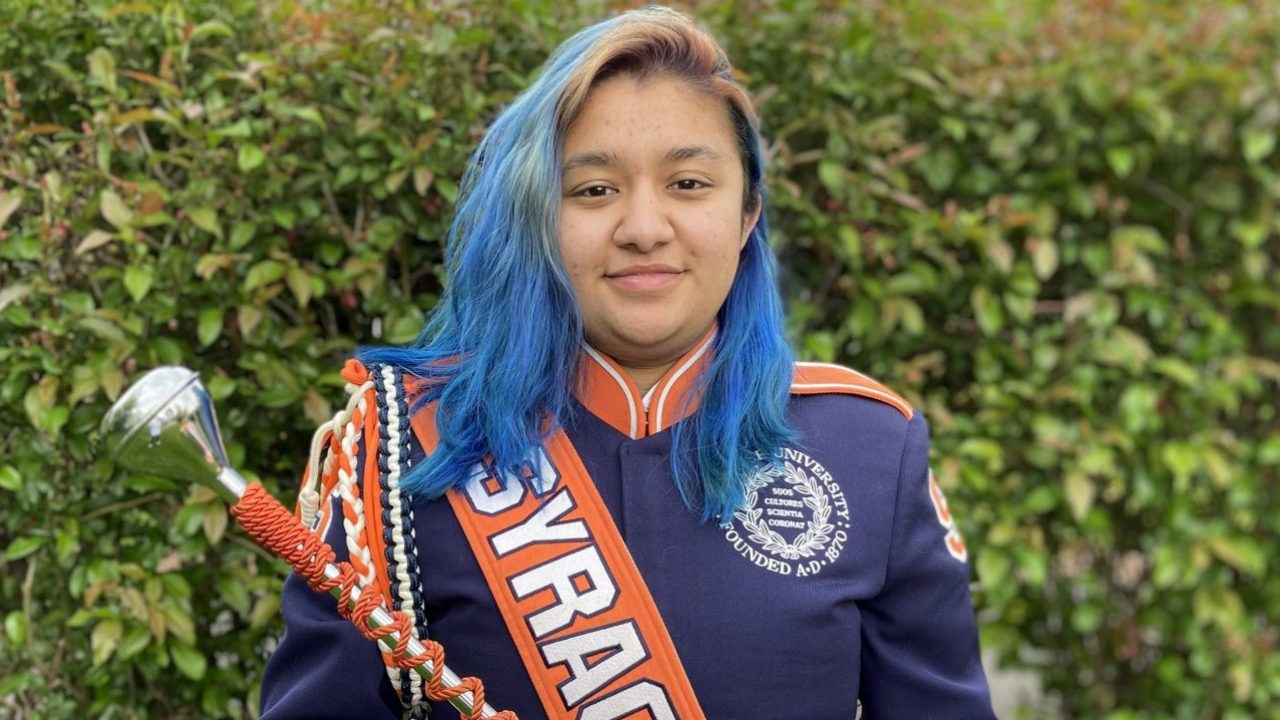
SYRACUSE, N.Y. (NCC News) — The drum major is the most important role in a marching band. Someone who has earned this role is Mita Gangopadhyay, a senior at Syracuse University.
Gangopadhyay became a drum major as a non-binary Indian American, using the pronouns she/they. Gangopadhyay came out as non-binary in college, but she doesn’t let the chance of being treated differently get to her.
“Nor does it really define me in any way,” Gangopadhyay said. “It’s a part of me, but it doesn’t define my personality or whatever. I feel like if you talked to my friends, they’d be like ‘Oh, that’s just Mita.'”
Gangopadhyay’s journey began on the other side of the world in India. She and her family immigrated to the United States in 2001. Gangopadhyay’s family has always been into music.
“My family cares about music; it is something that my dad is really passionate about,” Gangopadhyay said. “I’m the only wind instrument player in my family, but that’s my one thing being the different instrument person in my family, so they were definitely supportive of that.”
Gangopadhyay began playing the flute from fourth grade until eighth grade. Then, she picked up the flute again when she came to college. Her performance as a flutist helped her become a flute leader in the marching band at SU. When the COVID-19 pandemic rolled into last fall, it helped Gangopadhyay realize she had enough experience as a flute leader to become a drum major.
“I realized I do have the stuff to back it up,” Gangopadhyay said. “I was, like, very confident in myself and very confident that I knew with my help, I can help run the band smoothly.”
Philip Galati, a freshman at SU who was also selected as a drum major this year, was glad to see Gangopadhyay take advantage of the opportunity.
“She saw that opportunity for new leadership and took it,” Galati said. “I totally commend her for that, because I think she’s an awesome person for the job.”
Realizing she had enough to become a drum major was not the only thing she understood in college. She also learned coming out as non-binary in college was the right thing to do.
“Ultimately, I think it was okay,” Gangopadhyay said. “What I was afraid of never really happened, And honestly, if someone wants to treat me differently for that, I definitely have the strength to be able to … not just to advocate for myself.”
Gangopadhyay thinks the impact that it has will spread across campus lines.
“It’s like seeing a role in a powerful movie, being a minority,” Gangopadhyay said. “It’s akin to that kind of representation. Because it is like, ‘Oh, that is attainable. There have been people who have done it before me, so I don’t have to be the first.'”
Band director Timothy Diem did not know Gangopadhyay well until last year when she became a flute leader but knows Gangopadhyay has the marching band’s approval.
“I kept hearing from inside the band that she’s a really good person and leads really well,” Diem said. “So then she tried out for drum major, great. All for it. And the students had a strong response for her, which is great.”
Gangopadhyay said she thinks what she represents as a non-binary Indian American makes her ready for the opportunity.
“I think representation really matters,” Gangopadhyay said. “Which is another reason I push myself to do better.”




